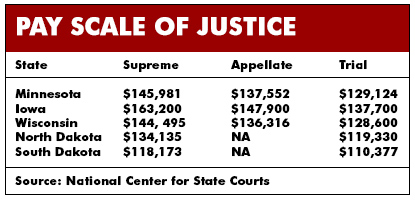State’s judges in middle of pack for pay
By: Joe Yovino, [email protected]//May 16, 2013//
 One way or another, the approximately 300 judges in Minnesota are getting a raise next year. There are no such raises, however, planned for Wisconsin judges.
One way or another, the approximately 300 judges in Minnesota are getting a raise next year. There are no such raises, however, planned for Wisconsin judges.
On average, Wisconsin Supreme Court Justices earn $144,495 per year, while Appeals Court judges make $136,316. Trial judges average $128,600 per year, according to 2012 data from the National Center for State Courts.
In Minnesota, the budgets approved by the House and Senate last month and the budget recommendations submitted by Gov. Mark Dayton all included salary increases for district and appellate judges and Supreme Court justices.
The Minnesota Senate proposal is a 4 percent salary increase in each of the next two years. The House proposal sets the increase at 3 percent. Under the Senate plan, a trial judge who makes $129,000 in 2013 would make about $139,660 by July 1 2014. Supreme Court Justices make $145,981 (the chief justice makes $160,579) and appellate court judges make $137,552.
Minnesota and Wisconsin judges rank about in the middle to the lower third nationally for judicial pay. Wisconsin ranks 34th nationally for Supreme Court Justice pay. The state ranks 27th in appellate court pay and 33rd in trial court salaries, according to the National Center for State Courts.
Judicial salaries in Minnesota have not increased since July 2008. A study by an economist at Macalester College concluded that it would take a 5.8 percent raise in 2014 and 2015 to return Minnesota judges to the “real salary level” they had in 2002.
Ramsey County, Minn., Judge Gregg Johnson, the president of the Minnesota District Judges Association, said that a trial court judge makes about equal to the salary of a first-year associate at the state’s 20 or so largest law firms. Minnesota judges are undercompensated compared to judges in other states and also compared to senior-level county attorneys and public defenders, he said.
 “This isn’t so much about the judges on the bench now, but going forward the retention and recruitment of good candidates will become a challenge if people are leaving the bench to go to private practice in order to afford to send their kids to college,” he said.
“This isn’t so much about the judges on the bench now, but going forward the retention and recruitment of good candidates will become a challenge if people are leaving the bench to go to private practice in order to afford to send their kids to college,” he said.
Ramsey County Judge Kathleen Gearin said the idea that the low pay, by judicial standards, will keep qualified candidates from applying is not just lip service. Many private-practice lawyers would be surprised to learn that judges pay to renew their own law license, and most can’t get reimbursed for cell phone bills even if they are for work-related minutes.
She has noticed judicial appointments from private practice are less frequent than 10 or 15 years ago.
In Minnesota’s metro counties there are usually a few dozen people who apply for open spots on the bench, but she said counties in outstate Minnesota have a harder time attracting applicants.
And numbers don’t tell the whole story, Gearin said.
“We don’t always have the variety we used to on the bench,” said the former chief judge, who is retiring in July. “District-wide it is important to have judges with different experience. You need people from civil, from criminal and from family law. You need judges that can take the lead in those different areas.”
Judge James Swenson in Hennepin County, Minn., said he is aware that the salary has deterred people from applying, especially those with younger children looking ahead at college tuition. He started in private practice after graduating law school in 1976 and was appointed to the bench in 1995.
A few legislators from both parties in Minnesota have been skeptical from the beginning.
Sen. Julianne Ortman, R-Chanhassen, has been the most vocal critic. She said the better use of money would be to add more judges to reduce the case load numbers across the state, not increase the pay of the ones on the bench. Ideally, the state could afford to raise pay of many state employees, including legislators, but the economic reality is it can’t, she said.
“A judicial position is well compensated in the state of Minnesota,” she said. “Being a judge is public service. There are other options available. If they want to make money, they should go and make money. If they want to do public service, they should realize they can’t be as well compensated as they would be in a private firm.”
She said if you look at the salary ranges across the legal profession, $129,000 a year is not a small amount.
The judges agree that there is never a “good time” to be asking for a raise and have been working at the Legislature for the past two sessions to get the proposal this far. Swenson said that just because the Legislature doesn’t want to take the political risk of giving itself a raise, that is not “a legitimate reason to not give a raise to someone else.”
And one reason for the raise is the quality of the bench across the state; Minnesota taxpayers are getting value from their judges, he said. The state Office of the Legislative Auditor determined in a recent study that judges in Minnesota were handling on average about 35 percent more cases than their counterparts in the Dakotas, Wisconsin, Iowa and Illinois, Swenson said.
“When you look at the difference of Iowa versus Minnesota and then add the fact [the judges] do about a third less work. I think equity does enter the picture,” he said.
Minnesota Lawyers’ Patrick Thornton also contributed to this report.
Legal News
- Milwaukee’s Common Council now has the most African Americans, women and openly LGBTQ members ever
- Office of School Safety Provides Behavioral and Threat Assessment Management Training Ahead of 25th Anniversary of Columbine Shooting
- Wisconsin Supreme Court to hear arguments in Democratic governor’s suit against GOP-led Legislature
- Lawsuit asks Wisconsin Supreme Court to strike down governor’s 400-year veto
- Wisconsin man pleads not guilty to neglect in disappearance of boy
- ACS Selects University of Wisconsin Law School’s Miriam Seifter for 2024 Ruth Bader Ginsburg Scholar Award
- People with disabilities sue in Wisconsin over lack of electronic absentee ballots
- Wisconsin Republicans ignore governor’s call to spend $125M to combat ‘forever chemicals’
- Native American voices are finally factoring into energy projects
- Steven Avery prosecutor Ken Kratz admits ‘mistakes were made’
- Colombian national extradited to Milwaukee faces International narcotics-trafficking conspiracy charge
- MPD: Milwaukee homicides down nearly 40 percent compared to last year
WLJ People
- Power 30 Personal Injury Attorneys – Russell Nicolet
- Power 30 Personal Injury Attorneys – Benjamin Nicolet
- Power 30 Personal Injury Attorneys – Dustin T. Woehl
- Power 30 Personal Injury Attorneys – Katherine Metzger
- Power 30 Personal Injury Attorneys – Joseph Ryan
- Power 30 Personal Injury Attorneys – James M. Ryan
- Power 30 Personal Injury Attorneys – Dana Wachs
- Power 30 Personal Injury Attorneys – Mark L. Thomsen
- Power 30 Personal Injury Attorneys – Matthew Lein
- Power 30 Personal Injury Attorneys – Jeffrey A. Pitman
- Power 30 Personal Injury Attorneys – William Pemberton
- Power 30 Personal Injury Attorneys – Howard S. Sicula











